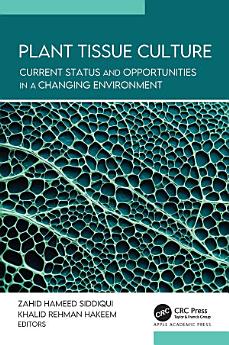Plant Tissue Culture: Current Status and Opportunities in a Changing Environment
About this ebook
This book discusses the use of plant tissue culture for producing superior material for planting and creating new, elite varieties of different kinds of crops in response to changing climatic conditions. It draws attention to the issues and dangers posed by climate change for plants and offers guidance for sustainable development utilizing tissue culture technology. In addition, it focuses on some fundamental ideas of plant tissue culture, presents studies that address climate change, and offers sustainable development alternatives. The book looks at important topics such as the benefits of synthetic seed technology, the impact of phytohormones and growth regulators on plant tissue culture, the impact of supplementing culture medium with organic substances, various plant tissue culture techniques, and more.
This book will prove beneficial for plant biotechnologists, environmentalists, ecologists, and scientists in enhancing their understanding of the complexities of climate change under in vitro conditions.
About the author
Zahid Hameed Siddiqui, PhD, is Assistant Professor at Tabuk University, Saudi Arabia. He is an environmentalist and plant biotechnologist. His interests include environmental pollution, conservation biology, and secondary metabolite production-based studies. With nine years of teaching and research experience in plant biology, he has to his credit many research papers in prestigious journals, reviews, book chapters, and books. He has co-authored a book titled Basics of Environmental Science. He is an active participant and presents his work at international and national seminars and conferences. Earlier, he worked as a principal investigator and co-investigator on many university-funded research projects. He is also actively engaged in developing research facilities at the University of Tabuk. Dr. Siddiqui has received many prestigious awards for his work.
Khalid Rehman Hakeem, PhD, is Professor at King Abdulaziz University, Jeddah, Saudi Arabia. He is affiliated with the University of Kashmir, Srinagar, India; the Universiti Putra Malaysia, Selangor; and Jinan University, Guangzhou, China. Dr. Hakeem has more than 14 years of teaching and research experience in plant eco-physiology, biotechnology and molecular biology, medicinal plant research, plant-microbe-soil interactions, and environmental studies. Dr. Hakeem has authored and edited many books with international publishers as well as nearly 200 research publications in international journals and over 50 book chapters in edited volumes. He is included in the advisory board of Cambridge Scholars Publishing, UK. He is also a fellow of the Plantae Group of the American Society of Plant Biologists, member of the World Academy of Sciences, member of the International Society for Development and Sustainability, Japan, and member of the Asian Federation of Biotechnology, Korea.






